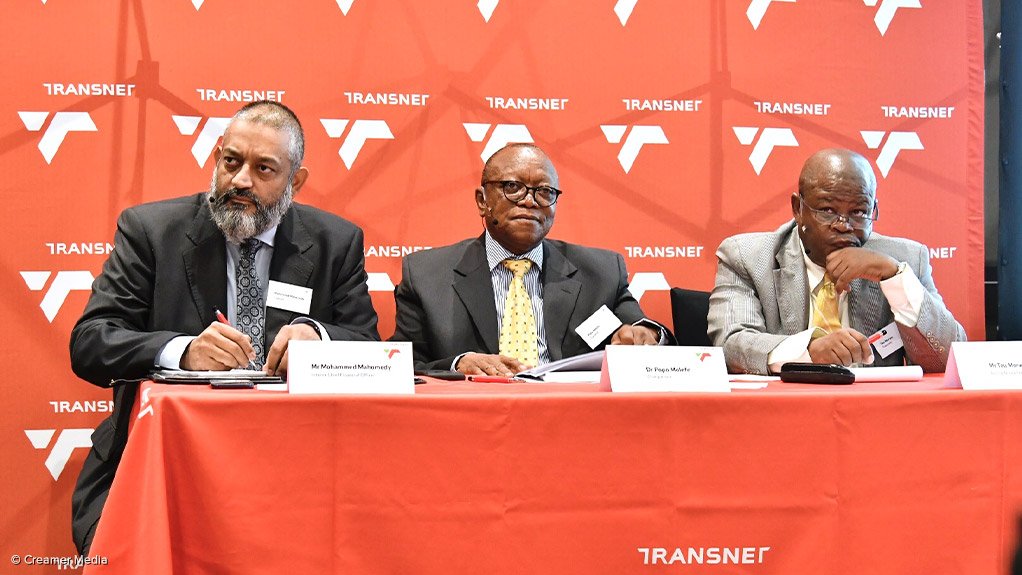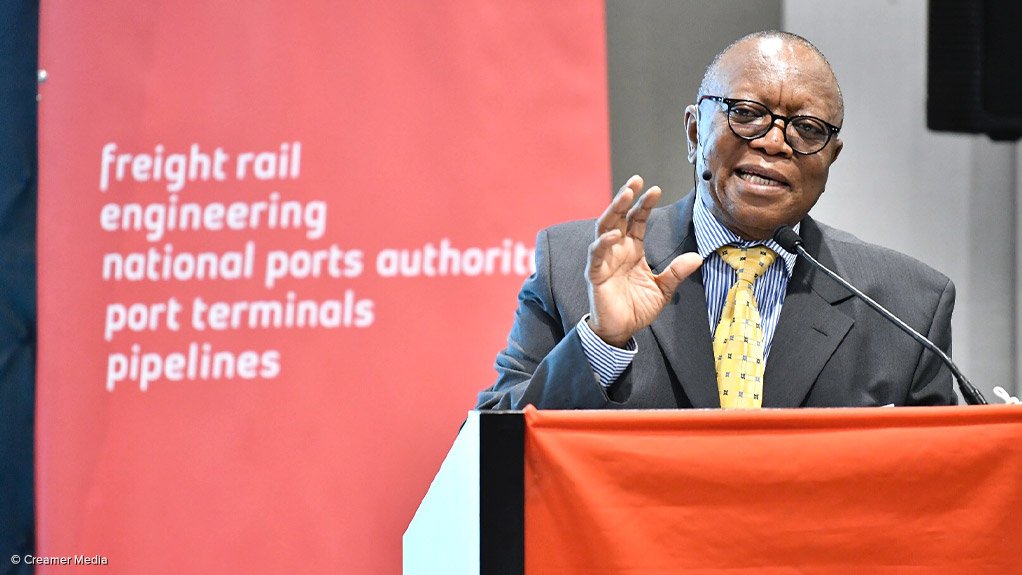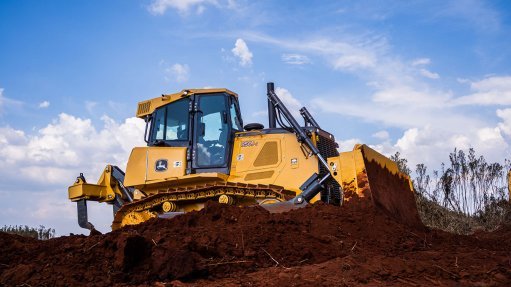Transnet to pursue ‘just and equitable’ settlements with rail OEMs awarded ‘unlawful’ contracts



Mohammed Mahomedy, Popo Molefe and Tau Morwe
Photo by Dylan Slater
Transnet chairperson Dr Popo Molefe
Photo by Dylan Slater
Having determined the procurement of 1 064 diesel and electric locomotives to be “irregular and unlawful”, Transnet has communicated its intention to review contracts awarded to four original equipment manufacturers (OEMs) in 2015.
The State-owned freight logistics group has also indicated that it will seek to recoup those portions of the contracts that had been inflated as a direct result of corrupt activities at the company, which chairperson Dr Popo Molefe said had been captured, until recently, by a group of “professional thieves”.
The new board, appointed in May last year, became particularly uncomfortable with the rise in the price tag from R38.6-billion to R52-billion, as well as the role played by an intermediary firm, with links to the Gupta family, which is alleged to have pocketed as much as R5.3-million for each R50-million locomotive supplied by one of the OEMs, China South Rail (CSR).
Molefe reported that Transnet would enter into talks with the four suppliers as early as this month in a bid to secure “just and equitable” settlements aligned with the group’s revised locomotive requirements.
Transnet currently calculates that requirement to be 953 locomotives by 2025, instead of the 1 064 locomotives that were initially earmarked to enter Transnet Freight Rail’s network by 2017 – a schedule that was subsequently revised, partly as a result of lower-than-expected demand and partly to accommodate the relocation of assembly by two OEMs to Durban.
Molefe stressed that it would be premature to provide details on what Transnet would deem to be a fair settlement, but confirmed that it was likely to involve a reduction in the number of locomotives eventually delivered to Transnet Freight Rail (TFR). He also hinted to penalties for late delivery and a lack of adherence to localisation.
The contracts were unlikely to be cancelled outright, as was the case at the Passenger Rail Agency of South Africa (PRASA), where Molefe presided over a board-led process to tackle corruption at the company prior to being appointed chairperson of Transnet in May last year.
Under Molefe’s stewardship, the PRASA board took legal action to set aside the R2.6-billion deal with Swifambo Rail Leasing for locomotives supplied by Spanish locomotive manufacturer Vossloh and which were found to be too tall to operate on parts of South Africa’s network.
The four Transnet contracts were awarded to four separate OEMs in 2015, namely: General Electric (GE), to supply 233 diesel locomotives; China North Rail (CNR), which was contracted to supply 232 diesel locomotives; CSR, for 359 electric locomotives and Bombardier Transportation (BT), for 240 electric locomotives.
By the end of the 2018 calendar year, GE had delivered all 233 locomotives and CSR had delivered 208 electric locomotives, CNR and BT had delivered 21 and 25 locomotives respectively.
A further 49 locomotives are deemed to be work in progress, some 417 short of Transnet’s new requirement for 953 locomotives.
“With GE having supplied all their locomotives, obviously if we arrive at the conclusion that we would not need all 1 064 locomotives, then we have to renegotiate with the others,” Molefe said, while stressing that Transnet would not “act recklessly” when reviewing the contracts with the OEMs.
CRIMINAL & CIVIL ACTION
In parallel, Transnet is pursuing criminal and civil action against those who Molefe said sought to turn the organisation into a “horror show” and treated its resources as a “piggy bank”.
All criminal cases are being pursued in cooperation with the Special Investigations Unit and the Hawks, but Transnet is also pursuing civil claims worth R1.3-billion against companies and individuals, including former CEOs Siyabonga Gama and Brian Molefe and former CFOs Anoj Singh and Garry Pita.
It is also taking action to recoup money from Regiments Capital and is doing an assessment of the value it received from its contracts with McKinsey, which has already paid back R1-billion on fees to Eskom.
The group is also hoping to convince its external auditors that it has a handle on its irregular expenditure, a figure that surged to over R8-billion in 2017/18. SizweNtsalubaGobodo qualified Transnet’s financials, owing to the fact it was unable to obtain sufficient evidence that the information on irregular expenditure was complete and accurate.
The qualification resulted in Transnet breaching covenants with several lenders, from whom it was forced to secure urgent waivers to prevent a default on loans valued at over R120-billion.
Acting CFO Mohammed Mahomedy revealed that, while the irregular expenditure figure was likely to rise again as a result of its further investigations, it was too early to offer any guarantees that these probes would satisfy the auditor’s requirement for a complete and accurate figure. Therefore, Transnet would meeting with the “eight to ten affected lenders” in the coming weeks to brief them on the problem and the fact that a further waiver might be necessary.
Mahomedy stressed, though, that there was no immediate risk of any default, with Transnet having generated R26.8-billion in cash year-to-date, which was more than sufficient to meet its repayment obligations.
For the interim period to September 30, Transnet reported a 15% decrease in after-tax profit to R2.8-billion, despite a 1.3% rise in revenue to R37.6-billion.
Acting CEO Tau Morwe, whose six-month contract would be extended beyond the initial horizon of April 30, said his immediate focus would be on improving the performance of Transnet Freight Rail (TFR), which reported a drop in coal and general freight volumes during the first half of the year.
Morwe said the group’s ‘stability and growth’ plan would seek to integrate more cooperation with the private sector to address constraints to shifting volumes from road to rail.
He was particularly keen to leverage private sector finance and capacity in expanding capacity on the Natcor general-freight corridor from Durban to Johannesburg.
“If we can fix TFR, we will be well on our way to fixing over 50% of Transnet’s problems.”
Comments
Announcements
What's On
Subscribe to improve your user experience...
Option 1 (equivalent of R125 a month):
Receive a weekly copy of Creamer Media's Engineering News & Mining Weekly magazine
(print copy for those in South Africa and e-magazine for those outside of South Africa)
Receive daily email newsletters
Access to full search results
Access archive of magazine back copies
Access to Projects in Progress
Access to ONE Research Report of your choice in PDF format
Option 2 (equivalent of R375 a month):
All benefits from Option 1
PLUS
Access to Creamer Media's Research Channel Africa for ALL Research Reports, in PDF format, on various industrial and mining sectors
including Electricity; Water; Energy Transition; Hydrogen; Roads, Rail and Ports; Coal; Gold; Platinum; Battery Metals; etc.
Already a subscriber?
Forgotten your password?
Receive weekly copy of Creamer Media's Engineering News & Mining Weekly magazine (print copy for those in South Africa and e-magazine for those outside of South Africa)
➕
Recieve daily email newsletters
➕
Access to full search results
➕
Access archive of magazine back copies
➕
Access to Projects in Progress
➕
Access to ONE Research Report of your choice in PDF format
RESEARCH CHANNEL AFRICA
R4500 (equivalent of R375 a month)
SUBSCRIBEAll benefits from Option 1
➕
Access to Creamer Media's Research Channel Africa for ALL Research Reports on various industrial and mining sectors, in PDF format, including on:
Electricity
➕
Water
➕
Energy Transition
➕
Hydrogen
➕
Roads, Rail and Ports
➕
Coal
➕
Gold
➕
Platinum
➕
Battery Metals
➕
etc.
Receive all benefits from Option 1 or Option 2 delivered to numerous people at your company
➕
Multiple User names and Passwords for simultaneous log-ins
➕
Intranet integration access to all in your organisation
















